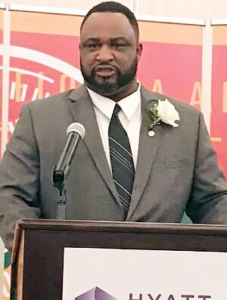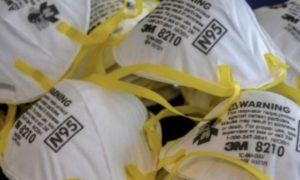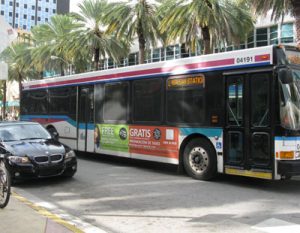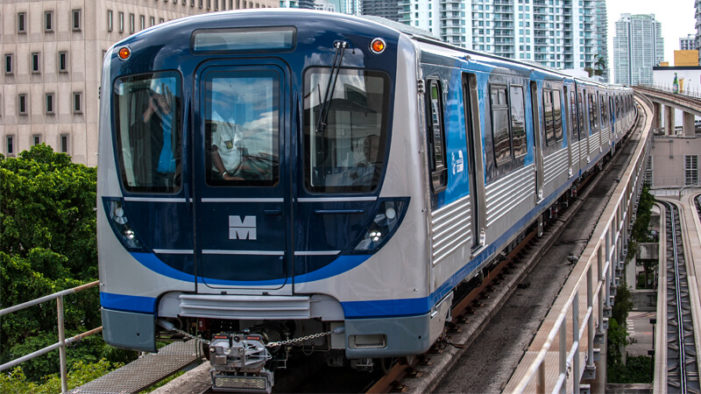Two Miami-Dade bus drivers and an employee from the radio room have tested positive for coronavirus in recent days, their union leader said, as transit workers — who are also on the front lines — continue to work without protective gear.
And the southbound Route 9 bus in Aventura had 60 passengers on board Friday morning. Maybe they should call it Route 19. As in COVID19.
“To have 60 people on the bus is just not healthy,” said Jeffrey Mitchell, president of the local Transport Workers Union  chapter, who has been making spot checks on the busiest routes.
chapter, who has been making spot checks on the busiest routes.
Mitchell said the new guidelines are to have a maximum of 25 passengers. Wait, 25? Two dozen plus one, plus a driver? So 26 people in one 40-foot petri dish. Oh, that’s right! Because Mayor Carlos Gimenez banned congregations of more than 10 people except on buses or trains, which are obviously magical COVID-free zones. If anyone wants to have a party, catch a bus.
Even so, when drivers radio for a replacement bus because there are 25 people on board, the answer is usually there is no replacement bus coming, Mitchell told Ladra. “And we ain’t in the business of leaving people stranded.”
He has identified 10 very busy routes where cuts in service have forced buses to travel with more passengers. “We need more buses on those heavy routes because they’re being swamped,” Mitchell said. Even though passengers are asked to board through the rear door to protect the driver — and/or themselves from the driver — it is impossible to keep social distance guidelines when there are 25 people in a 40-foot bus.
The county is “still ordering” the personal protection items they need — gloves, masks, hand sanitizer, Mitchell said. “They’re scrambling. They’re trying to get it now. But it’s a little late.
Read related: Stay home for COVID19 — unless you catch a bus, grab a bite, need toilet paper
“Lots of people still don’t have any masks, unless they bring it from home, and those are usually not the right kind,” Mitchell said.
“They’re giving our operators one pair of gloves, one sanitary wipe per shift and they fill the little, personal bottle of sanitizer once a week,” Mitchell said. “They usually don’t last a week.”
It’s gotten so bad that the union has ordered 10,000 masks and gloves on its own. “We just went out and bought it ourselves  because we can’t keep waiting,” Mitchell said.
because we can’t keep waiting,” Mitchell said.
The two largest transit unions in the U.S., representing 330,000 transit workers nationwide, got together Friday to demand that government transit agencies in Miami, New York City, Washington, D.C., Chicago, Boston, Philadelphia, San Francisco, Atlanta, Houston, Dallas, Detroit and Colombus, Ohio, provide more sanitation and protective gear to members who may be exposed to coronavirus every day they go to work.
“We are not cannon fodder. Dying is no way to make a living,” reads the headline of a press release from the Transport Workers Union of America (TWU) and the Amalgamated Transit Union (ATU) where they vowed to take “aggressive action” if operators don’t better protect their workers from COVID19.
This “historic agreement to work collectively to put maximum pressure on transit agencies that are failing to take protective measures to safeguard” is on behalf of bus operators, train operators, conductors, track workers, car cleaners, mechanics, and other frontline transit workers.
Read related: Day 5 of COVID19 in Miami-Dade — more closures, masks and tests coming
Hundreds of transit workers in more than 20 states have already tested positive for COVID19. More are certainly going to be. New York City, where 10 transit workers  have died, may be the national epicenter of the pandemic today, but the virus continues to spread across the country and Miami-Dade is expected to “peak” in three to five weeks. Coronavirus fatalities among transit workers have also been confirmed in Detroit, New Orleans, Philadelphia, Boston, Washington, D.C., Rocky Hill, Connecticut and Everett, Washington.
have died, may be the national epicenter of the pandemic today, but the virus continues to spread across the country and Miami-Dade is expected to “peak” in three to five weeks. Coronavirus fatalities among transit workers have also been confirmed in Detroit, New Orleans, Philadelphia, Boston, Washington, D.C., Rocky Hill, Connecticut and Everett, Washington.
Miami-Dade County and other agencies nationwide haven’t shut down transit because it is a needed pipeline that delivers essential workers — first responders, healthcare workers, food industry employees — to work. But they are also putting these same essential workers — which include the bus and train operators — at risk.
“America cannot properly fight COVID-19 without transit workers. The government must ensure they are properly protected,” the unions’ joint statement read.
“If transit agencies don’t take immediate and dramatic steps to protect our members, there will be serious consequences,” TWU International President John Samuelson said. “We will not sit back and let transit workers be treated like cannon fodder in this war against the coronavirus. We can—and will—take aggressive action.”
The demands are that transit agencies:
- Provide gloves and masks to transit workers
- Regularly disinfect buses, trains, streetcars, and worker facilities, including crew rooms
- Enforce rear-door boarding to maintain a safe distance between riders and bus operators
- Suspend use of any timekeeping systems that require multiple workers to touch the same digital screen, keyboard, or fingerprint-scanning device
- Begin systematically cleaning and sanitizing equipment and facilities
- Urge riders to cover their faces with a bandana or scarf if they are not wearing masks while riding mass transit
- Mandate social distancing among transit riders using their systems, as well as workers in crew rooms and other facilities
- Provide in the line of duty death benefits for employees
- Agree to ‘pandemic leave’ policies that ensure no one potentially exposed to COVID is compelled to go to work to keep their job.
“Too many transit agencies are not providing personal protective equipment for their employees, endangering the lives of our  members and the families they go home to, Amalgamated Transit Union International President John Costa said in the statement.
members and the families they go home to, Amalgamated Transit Union International President John Costa said in the statement.
“It is beyond shameful that those tasked with overseeing these agencies during this crisis have allowed us to arrive at this juncture! We are prepared to take whatever aggressive action is necessary in order to protect our members and their families,” Costa said.
Read related: Miami-Dade COVID19 focus stays on seniors as data shows younger at risk
“Nothing is off the table. Dying is no way to make a living.”
The strong wording in the language used by he international labor leaders sounds like a strike is looming, and isn’t that what always happens in the apocalyptic movies? The transit and sanitation workers strike first?
But Mitchell said that Miami-Dade transit employees consider themselves essential workers because they serve a critical need that could become even more vital in a time like this. Already, nurses at Jackson Memorial Hospital have complained about the reduced hours on MetroRail because they can’t get home after their night shifts, Mitchell said.
“It isn’t our plan to strike,” Mitchell said, “but to bring public awareness to the fact that they aren’t giving us the proper equipment.”
Until they do, Gimenez and his staff and Transit and Public Works Director Alice Bravo should ride Route 9 every morning.

